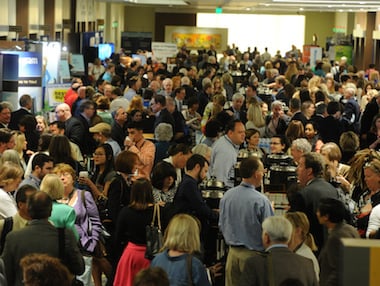PBS’s Kerger urges Annual Meeting audience to be bold amid change

SAN FRANCISCO – The PBS Annual Meeting kicked off here Tuesday with a crowd of more than 1,100 registered participants, the most to attend in at least 10 years, according to the public broadcaster.
And those attendees face a lot of decisions, with more than 92 breakout sessions to choose from.

More than 1,100 registered attendees at the PBS Annual Meeting this week at the Marriott Marquis in San Francisco make it the largest such gathering in at least 10 years. (Photo: Les Kamens, The Photo Group)
PBS is changing things up this year, trying an Open Space format. Instead of watching moderated panels, participants are breaking into groups for topical discussions.
Subjects were derived from suggestions from stations based on the meeting’s theme, “Think Local.” Topics include “Giving Circles – Fad or Fortune?”, “Reaching English Language Learners and Leveraging New Revenue,” “The Future of Video” and “Rethinking Public Media Approaches to Early Learning.”
“We want to take the conversations that used to happen in the hallways and move them into the meeting rooms,” PBS President Paula Kerger said in her keynote speech. “And so we are using some new approaches that we believe will allow us to tap the full set of experiences, wisdom and talent of everyone in the system.”
Media are not allowed in the breakout sessions.
In her speech, Kerger focused on the subject of change: in the media landscape, in the public broadcasting system and at PBS.

“We must reimagine how we fulfill our mission,” PBS President Paula Kerger tells the crowd in her keynote address Tuesday. (Photo: Les Kamens, The Photo Group)
“We are in the midst of a radical change in media – look no further than the recent Emmy wins by Netflix, or the proposed merger between Time Warner and Comcast,” she said.
Technology will continue to evolve, and the media landscape will only become more cluttered, Kerger noted. She believes the pubcasting system has two choices. “We can try to adapt around the edges and preserve our territory in the television space,” she said. “Or we can be bold and set out with renewed vigor to fulfill our public service mission, using the best of tomorrow’s technology and platforms.”
“I think the choice is clear,” she said. “We must be bold. And we must seize on what makes our system so unique and so powerful in order to imagine the public broadcasting system of tomorrow.”
Kerger said she believes that public television stations “are no longer in just the content or services business.”
“Instead we are in the business of providing educational experiences, using the power of our platform to inform and inspire the American people. This is a transformational change in how we conceive of our work.”
“And it will require new thinking, and new inspiration, from everyone in our system,” she added. “As we create the public media system of the future, we must reimagine how we fulfill our mission.”
Kerger said changes at PBS include the appointment of several new senior managers: Betsy Gerdeman, development; Ira Rubenstein, digital; Juan Sepulveda, station services; and Mario Vecchi, technology. “I specifically sought people who would join in with the existing team to work collaboratively and think holistically about what lies ahead in order to break down silos and work together at PBS to maximize the service we provide to stations,” Kerger noted.
Participants got a chance to hear from all four in the next session, as Kerger interviewed each on stage. Sepulveda said his priority is to “activate the network” and get stations working together; Gerdeman assured the crowd, many of whom work at PBS member stations, that “I still get up every day and put my station hat on. The services we provide are for your benefit.”
Other general sessions on Tuesday included a primetime programming preview with peeks at three “wild” new science programs: Earth a New Wild, looking at how humans affect the planet and interact with its animals; My Wild Affair, presenting unique bonds of friendship between people and animals; and Sex in the Wild, revealing the complications of reproducing in sometimes hostile environments.







Very important for the future of public broadcasting. I think so, but PBS is the most confident source of public television in the world. Don’t forget to make your support any time you want.